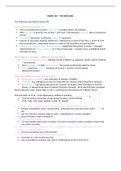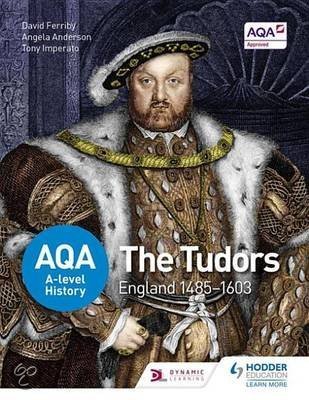HENRY VIII – THE NEW KING
The Character and Aims of Henry VIII
THE CHARACTERS OF HENRY VIII:
Henry succeeded the throne in April 1509, 2 months before 18th birthday
Well educated in prep for role as king -> well read + introduced to humanist ideas (renaissance
prince)
Charming + agreeable + produced positive 1st impression
Manner of succession displays astuteness + ruthlessness on part of new king -> death of H VII
was concealed for 2 days whilst Prince H + some of old councillors secured position
Richard Fox, Thomas Lovell + Richard Weston established themselves in power + arranged
imprisonment of Dudley + Empson on 1st day of new reign -> popular move, symbolised end of
old ways of ruling
Henry VIII’s way of ruling = v different from his father’s:
Lacked a strong work ethic, enjoying courtly activities e.g. pageants, revelry, sports, hunting
+ tournaments
Had little interest in daily business of gov but could act decisively when he chose
Relied heavily on others – members of Council + at times a chief minister
(Wolsey/Cromwell)
Henry also exhibited certain character traits:
Ruthlessness + cynicism (e.g. execution of Empson + Dudley)
Insecurity (e.g. willingness to resort to execution for treason, often using flimsy excuses)
Impulsiveness (eg. Speed with which he married C of Aragon, later marriages to Anne of
Cleves + C Howard & decision to execute Thomas Cromwell – all of which he later regretted
Henry believed in own ‘divine right’ to rule + conformed to the practices of Catholic Church
Characteristics of H VII + H VIII displayed by Holbein in painting:
H VIII showed to be strong, young, powerful stance, lavish clothing
H VII = pale, frail, weak, leaning on alter for support
1. How does Henry VII’s view of Henry VIII change once he becomes the sole heir?
Changes dramatically, Henry ‘closeted away’, protected from court and society until H VII
dies
Age 10, involved in sitting as judge in courts + educated by H’s various councillors
Henry VIII reflects reign of Edward IV
2. Why do think this happens?
1 of heirs already dead, wants to protect H as much as possible in order to produce a future king
who will be successful
3. Why does Cunningham label Henry VIII as a ‘traditional medieval king?’ (Remember: Henry VII
modern vs. medieval debate)
Process of preparing Henry VIII to be king
4. Why is Henry VIII’s transition to the throne ‘bizarre’?
H emerges as a rich and glorious king
Just surrounded by councilors who tried to instillmethods of Henry VII in Henry
,THE LEGACY OF HENRY VII:
Strong inheritance:
Main legacy to son = full Crown coffer (around £300,000) but also bequeathed peaceful
kingdom in which nobility had been checked + Tudor dynasty secured (H VII died Solvent)
Peaceful foreign policy -> third rate power, H VII = not aggressive/empire seeking (no threat)
Efficient government helped provide stability + welcome respite after Wars of the Roses
- Conciliar forms of gov (vanished under H VIII through Wolsey)
Had a good relationship with the Church
Weak inheritance:
o BUT some methods of raising revenue = unpopular -> hence Empson + Dudley executed
o Nobility possibly frustrated at harsh restriction placed on them by H VII
WAS HENRY VIII ‘BORN TO BE KING’
Education:
Spent his early years with mother, GM + sisters at Eltham Palace -> not expected to succeed
Not given any responsibility after Arthur’s death to make decisions on his own
Good renaissance education - studied English, French, Latin, Greek, arithmetic and astronomy
Sat on council meetings and travelled with the royal progresses
HVII added four young men to Prince Henry’s household - referred to in the account books as -
‘spears’ - personal bodyguards who accompanied him in military training
HVII made sure that his son looked like a chivalrous warrior prince and leader
What actions did H take in the early days of his reign to be a successful monarch:
Announced intention to make war on France
Showed himself to be strong, generous and brave
Restored rule of law + natural order: ancient rights of nobility
Repealed taxes + dues on merchants who could now trade freely again -> loved for this
Released some prisoners
HENRY VIII – ‘RENAISSANCE PRINCE’:
Great social + cultural change of 14 th-16th C
Renaissance – revival of European art, learning + culture characterised by interest in vulture +
ideas of ancient Greece + Rome + enthusiasm for learning, scholarship + arts
Renaissance writers wrote about qualities of ideal prince. Included being well-educated, just,
merciful + an excellent warrior + leader
,WHAT WAS THE IMPRESSION AT HENRY’S CORONATION (JUNE 1509)
Dawning of new age -> coronation greeted with ‘hysterical optimism’ –(Lauren Johnson)
Out with the old, in with the new
‘the end of our slavery, the fount of our liberty; the end of sadness and the beginning of joy’-
Thomas More presented this poem to H at coronation
Monarchs often written about in glowing terms by contemporaries – exaggerated
People in high spirits – v high living standards
However there were problems both present + soon after coronation:
- Contests over enclosure often spiralled into violence
- Religious non-conformity, repression of Heresy of ‘Lollardy -> many public burnings (1510-12)
- Food shortages due to failed harvests s + ‘disease killed far more than hunger’ (plague)
The Aims of Henry VIII
AIMS AS KING:
1) Dismantle unpopular aspects of his father’s legacy while maintaining stability
Actions:
Empson + Dudley executed; Council Learned abolished (Jan 1510); many bonds cancelled
Was a public decision
2) Dynastic security
Establish status among European monarchs through marriage + preserve dynasty (through
expectation of heir
Actions:
o Married Catherine of Aragon (June 1509)
o Seen as chivalrous towards virtuous young C, seen as conscious decision to put right
wrongs of past
o Since Arthur’s death, H7 refused to return her (/dowry) to parents / marry her to Henry –
had been prisoner in foreign land + won widespread admiration in England
3) Support nobility while preserving strong gov
Actions:
o Nobles’ sons became Henry’s personal companions in sport, leisure + war but their
political influence was limited e.g. Wolsey dominated as chief minister
4) Establish himself as warrIor king through success in battle
Wanted to be King of France
Imperial King
Actions:
o Pursued military glory through war with France - believes he has rightful inheritance to
French crown, only 80yrs since Henry VI crowned king of F
o Inspiration: Henry V at Agincourt during Hundred years war
5) Imperial king
Actions:
o Imperial King – dates back to Roman Empire – placed King next to God in importance on
Earth
o referred to England as ‘Empire’ governed by ‘one supreme head and king’
, WHAT WAS HENRY LIKE AS A KING:
1) Appearance and physique
‘striking’ in early years of adult life + took pride in his appearance
Had a fine physique -> tall, large framed, well-proportioned + very muscular
Carried himself well + paid a lot of attention to what he wore – ‘best dressed sovereign
in the world’ (described by foreigner)
2) Interests
Sport -> jousting
Food; health -> emphasises wealth (lavish)
More interested in romance than physical love -> Anne Boleyn
o Little interest in day to day running of country
3) Intellectual abilities
Prided himself on intelligence
Promoted people based on intellectual skills -> didn’t make judgements based on
emotion
Sent to outsmart members of aristocracy
o But had lack to intellectual training
4) Values and attitudes
Strong belief in hierarchy -> made him strong, believed he was top of hierarchy (hence
problem with pope)
o Believed women were inferior
o Lacked remorse + was emotionless -> executed many who rebelled against his policies
5) Beliefs
Believed strongly in divine right of kings
Brought up believing he was a true knight + should be chivalrous -> warrior, jouster
Should provide ‘trophies for his fair lady’ -> conquering abroad, warrior king
6) Personality and character
Servants could act almost independently -> willing to blame them when it goes wrong
Determined
o Could be a bully
o Indecisive on certain policies
AIMS OF HENRY VIII’S GOVERNMENT:
Early aims related to establishing himself + reserving best of what father left him while
marking out new course as king
Once position consolidated, aims became less clear -> always eager to pursue glory + secure
succession to throne BUT showed little interest in policy making except when it affected him
personally
Lasting effects of reign eg. Growing importance of P, destruction of much traditional religion +
plundering of Church wealth arose from circumstances + weren’t the results of clear set of
policy aims





